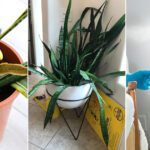Learn why you should water your houseplants less in cool months for better growth as needs of plants also changes with climate.
In the winter season, indoor plants receive less sunlight, which means their growth slows down too. Again, slower growth implies the need for less water. However, there are other factors like light intensity, home temperature, and humidity that influence the watering needs of your houseplants as well.
Why You Should Water Your Houseplants Less in Winter
Basically, when fall arrives, your houseplants start to get very little sunlight as the days are shorter in winter than in summer. So, your houseplants undergo dormancy until they get enough sunlight in the spring and summer.
Therefore, it is simple! When they go dormant, their growth and development slow down, so watering is also not required much. Moreover, if the watering frequency is not changed, then it might lead to overwatering and dead houseplants!
However, there is an exception to this concept! If your region has mild winter and no frosts, then the concept of less water doesn’t apply to your houseplants. This will be discussed further in a different section!
How Often To Water Houseplants In Winter
Dormant plants need less water, as they are not using as much of it! So, watering can be reduced to around once a fortnight in winter, basically when the plants are sleeping. However, there is always one obvious trick: check the top inch layer of your soil. Yes, this always works!
Again, occasional misting is something that is not off the table. Houseplants typically benefit from light misting with a spray bottle. This also helps to balance the humidity inside the house because the humidity inside is generally much less than outdoors so your houseplants may suffer from lack of humidity and misting will help them revive.
Signs of Overwatered Houseplants in Winter

Are you are wondering if your plants need more water during winter then the direct answer to this is No, no they do not! Watering less often is sometimes, the best thing you can do for your houseplants. Otherwise, you might deal with many problems that are listed below. Have a quick look!
1. Root Rot
Root rot is the first issue that will happen to your beautiful and happy houseplant companions if you overfeed them with water, even if they do not need it!
2. Microbial Infestation
Fungal or Bacterial pest infestations are difficult to deal with and require a lot of time to recover. You may lose your favorite buddies in most of them!
3. Molds
Moldy and mushy compost happens when you keep on pouring water on your plants, and this will gradually degrade the quality of the soil and provide less support to the roots. The growth will be weak and soft and will later attract pests like bugs and insects.
How to Save Them and a Few Exceptions

Know your home, region, and your house plants! There isn’t a one-fits-all answer to watering your houseplants in winter since your geographical region and the warmth of your home are the major factors in deciding the proper way of watering and the results of doing so. To avoid overwatering, follow the simple rule of checking the top inch layer of your soil before pouring any water into your plant.
Exceptions
- If your region has mild winter and no frosts then the concept of less water doesn’t apply to your houseplants. In such regions, water according to your plant needs, they might need water during the day if it is moderately warm.
- Regions like Canada, California, and Virginia do not experience low temperatures during winter, and according to several gardeners, their plants need more water during winter than in summer. This is because the climate is dry and less humid in such places, which is why the soil dries faster, and hence water is required frequently.









